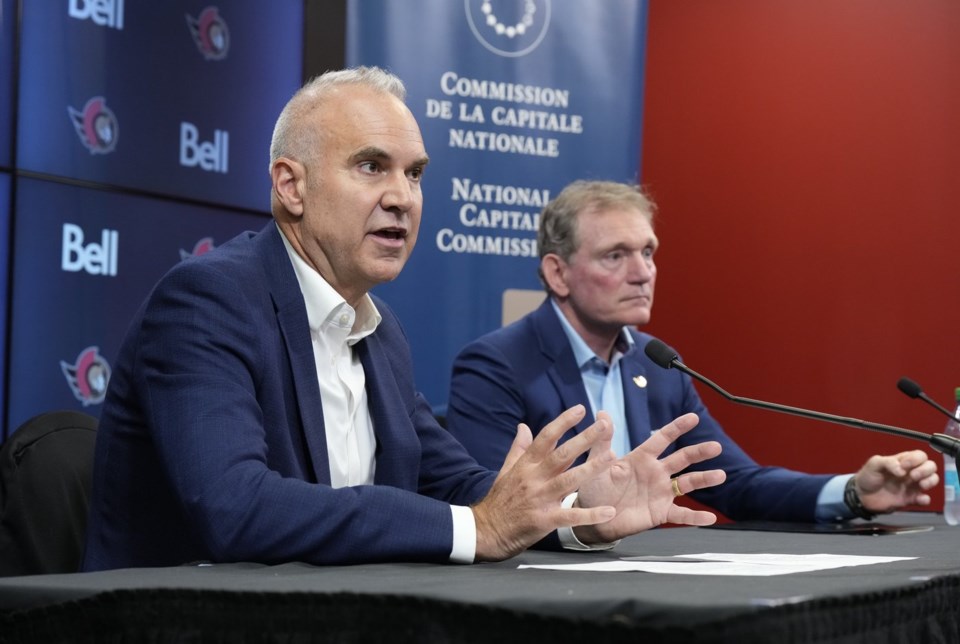OTTAWA — The Ottawa Senators and the National Capital Commission marked a significant milestone for both the city and the team Friday with the announcement of a new downtown development that will include an NHL arena.
The Senators, under new owner Michael Andlauer, had entered a memorandum of understanding with the NCC in June 2022 to develop the downtown LeBreton Flats area, with a deadline of Friday to reach a deal.
With an agreement in principle announced Friday, the way is paved for the Senators to relocate from their current suburban home in Kanata at the Canadian Tire Centre to a more central location.
The Senators and the NCC have gone through this process previously, only to see a previous deal fall through in 2019. But at a press conference Friday, NCC chief executive officer Tobi Nussbaum and Senators president and CEO Cyril Leeder both said there were reasons to be optimistic that this time would be different.
“I think it’s different for a whole bunch of reasons, most notably we’re in a position now where everybody wants this to happen,” Leeder said. “So, the team wants it to happen, Tobi and his team want this to happen, the community wants it to happen.
"We really are at a point where having an arena downtown is going to be great for the Senators."
The agreement includes the sale of 10 acres of land at LeBreton Flats to the Senators at what Nussbaum called "fair market value," a price that has yet to be determined. This is an increase and a change from the original plan for a long-term lease of six acres.
Leeder said land ownership was critical for the team’s future plans.
“It's already a very difficult, complex process, layering in doing it on leased land makes it even more complex,” said Leeder. “So, we really felt that in order for us to do all this work we're talking about going forward, make this effort to get this done, I really needed to have a site that we owned and give us the reduced amount of complexity in an already a complex process.”
Nussbaum said the NCC prefers long-term leases, but was willing to make an exception for this project.
The land is on unceded Algonquin territory and Nussbaum shared that the NCC has engaged with the Algonquin Nation and is working on a partnership with them.
There is also the fact that the land contains contaminated soil, and it remains to be determined who will be responsible for its cleanup.
Specific designs for a new arena have not been finalized, and there won’t be shovels in the ground any time soon. Both Nussbaum and Leeder cautioned the project is still in very early stages, with many studies and approvals needed before construction can begin.
Environmental assessments, geotechnical studies, transportation and mobility plans, and financing arrangements are all on the to-do list.
“I know it’s years, not months, before a shovel goes in the ground, so it’s going to take some time to get to that point,” Leeder said. “This allows that work to take place and move forward.”
While the arena is going to anchor the project, the Senators didn’t want it to be the only development on the vacant parcel.
Nussbaum acknowledged that while the arena is an exciting development for the city, it’s just one part of a broader vision for LeBreton Flats, which will eventually include over 6,000 housing units with a target of 25 per cent as affordable housing, as well as parks and public spaces.
“The NCC is committed to bringing on other development in the area in the same time frames as the arena,” Leeder said. “Will it be the same day, some of it might be. Will it be the next year, that’s good too. We’ve got an agreement that will bring that development on at the same time so that we’re not out there by ourselves.”
The development is expected to have a substantial impact on downtown Ottawa, drawing more people into the core for both hockey games and other major events. Leeder also highlighted the potential for attracting more francophone fans from Gatineau and bringing in more French-language entertainment acts to the city.
Leeder said they’re still a long ways from how they’re going to approach this project with the city, but said he “didn’t think so” when asked if there were expectations that taxpayers will need to contribute to the development.
While the agreement marks a significant step forward, the path to completing the arena and the overall development will be long. But unlike previous attempts to move this forward this time around both the Senators and the NCC are committed to ensuring the project is a success.
“There’s a real alignment of interests and alignment of agreement that this site makes sense,” Nussbaum said.
The Senators have played at the Canadian Tire Centre in Kanata, a suburb about 25 kilometres from the city's core, since 1996.
The drive from Ottawa's downtown to the Kanata facility, often made longer due to traffic, has been cited as an obstacle for attracting walk-up crowds — an issue teams with downtown arenas don't face.
"When you think about major facilities and the trends now and where they are, most arenas and stadiums are going downtown," Leeder said. "When we came out here 30 years ago that wasn't the case."
A previous deal to redevelop LeBreton Flats and build an arena under former owner Eugene Melnyk collapsed in 2019 following a fallout between Melnyk and business partner John Ruddy.
This report by The Canadian Press was first published Sept. 20, 2024
Lisa Wallace, The Canadian Press



